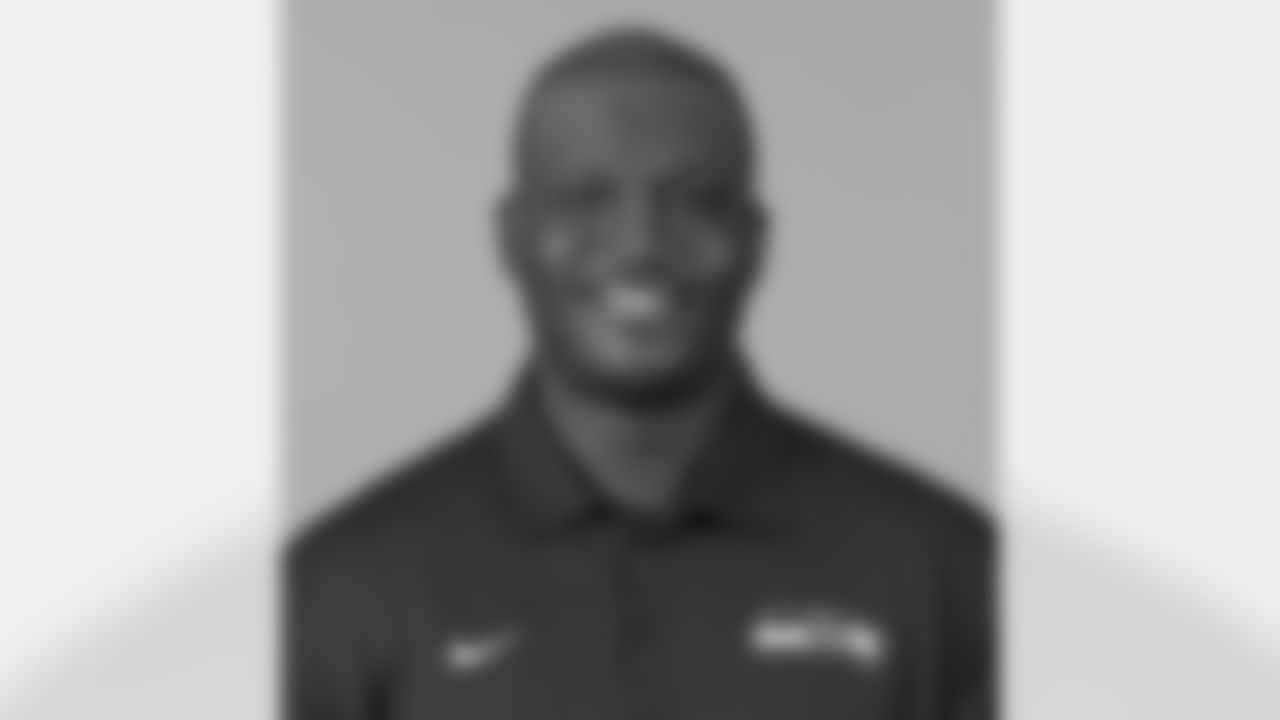"My favorite thing to do in the world is to talk football," Mike Macdonald said to an auditorium full of high school football coaches from across Washington state.
The new head coach of the Seahawks then proceeded to spend the next 40 minutes talking about football as part of the University of Washington's Be A Pro Coaching Clinic. And yes, there were plenty of Xs and Os, with Macdonald talking about things like how defensive fronts and coverage work together, or about defending screens, or about handling opposing offenses' increasing use of pre-snap motion, but more than that, Macdonald's time with local high school coaches helped shed a little bit of insight into the coaching philosophies and leadership style of the man who earlier this offseason became the youngest head coach in the NFL.
Macdonald's coaching style and philosophies won't fully emerge until he has spent some time leading the team and coaching games, but there were still some interesting things to glean from his time addressing those high school coaches earlier this month. So with players getting on the field this week with coaches for a voluntary minicamp, their first on-field work Macdonald and the new coaching staff, here's a bit of what we learned from Macdonald earlier this month:
When it comes to winning in the trenches, "We believe in knocking the crap out of the guy in front of you, and then some."
While answering a question about defensive fronts and pass-rush in particular, Macdonald noted that, for the most part, he isn't interested in moving linemen around for the sake of dressing things up. At the high school level, he noted, there can be more value in doing that when there are more physical mismatches to compensate for from week to week, but in the NFL where every team has top talent, Macdonald has a different goal in mind for his defensive front, one that if executed right, can set the tone for an entire team.
"We believe in knocking the crap out of the guy in front of you, and then some," he said.
How Macdonald plans to start with the basics when it comes to installing his defense.
When asked about what offenses are doing to stress defenses in today's NFL, Macdonald took a long and informative route to get to his answer, explaining how he wants to bring his defense along, from the start of offseason workouts in April through camp, so that by September it will be ready for those challenges offenses present.
"There's no perfect defense, otherwise everybody would run one call and everyone would be happy," he said. "There's strengths to calls and there's weaknesses, we call them stressors. So when we're installing these rules to our players, Day 1, these next two weeks in Phase 1, I'm not going to give them one call. All they're learning is coverages, structures and techniques. They're learning stresses and strengths of those calls, and how to execute individual techniques. By the end of Phase 1, we'll learn how to get lined up, then Phase 2, we'll start introducing calls, and then at that point all you're doing is just learning adjustments and it should be easier to learn.
"Imagine being a player and you get 17 things based on how an offense is lined up, there's no way I can play the way you want me to play, play the right way, consistently. But if you just say, hey I'm going to do the thinking for you and we're going to live in these five or six worlds, and just know them cold like the back of your hand, we're going to make it look the same, we're going to change the looks, move guys around and attack offenses differently, well now, shoot, those guys can play those six pretty good. They understand the stressors, but for the offense to find that for a 60 or 80-play game, that's going to be tough for them to do."
"I love guys who love football, man."
At one point in the clinic, Macdonald was asked about the most important traits he looks for in players, and while yes, there are physical traits that obviously are a big factor, he didn't hesitate to point out one of the most important traits that has nothing to do with size or speed or athleticism, and that was equally important in building a coaching staff.
"I love guys who love football, man," he said. "We do a lot of football. With coaches, what I wanted to hear when we interviewing guys was, when we turned the tape on, 'Oh man, this was awesome, we had this one problem, but we thought about the problem in a new way, and what happened was…' You can hear the excitement. You want that type of mentality of guys that love ball, and I thought that was something that popped with the guys we ended up hiring."
Macdonald went on to quote the two Harbaughs he worked under in Baltimore and at Michigan.
"This is a Jim Harbaughism," he said. "'You get good at football by playing football.' So we're going to get reps, we're going to maximize the time and be efficient."
Later, Macdonald added, "This is a John Harbaughism: 'Guys are allowed to get better.' You do that by getting direct reps and coaching them up the right way and positive reinforcement, and if guys don't love football, then you're not going to be out there. I believe in our ability to develop players, and it's fun to work with the guys who love it."
Why playing with "shocking effort" is important, and how Macdonald plans to make that happen.
A coach's scheme is important, as is the talent on the field, but for Macdonald, another key to playing winning football is, "shocking effort. It should pop off the screen like, 'Holy crap, how do they play like that?' Then it all starts from there."
Saying you want shocking effort, of course, is one thing, while getting it out of a team takes more work.
"So how do you get that?" he said. "Well you've got to be in great shape, you've got to have guys who love each other and want to play for one another—you can't be selfish. What you're asking them to do is be incredibly clear, and in order to do that, you have to build confidence. And when you build confidence, guess what happens? They communicate, because they know what the hell they're doing… We're talking pre-snap alerts, post-snap alerts, we're communicating, everybody knows exactly what we're doing, we're flying around, we're leveraging the ball, then you have, and then it starts to look like shocking effort. But it doesn't just happen overnight.
Macdonald's thoughts on leadership and the importance of supporting players.
Macdonald frequently points to lessons he learned from Jim and John Harbaugh when it comes to leading an NFL team, but when he was asked by the high school coaches about his approach to leadership, he quoted a less likely source, referencing a speech Steve Jobs gave to the MIT Sloan School of Management in 1992.
"I now take a longer-term view on people," Jobs told the group of students. "When I see something not being done right, my first reaction isn't to go fix it. It's to say, 'We're building a team here and we're going to do great stuff for the next decade and not just the next year, so what do I need to do to help so that the person that's screwing up learns,' versus, 'how do I fix the problem?'
For Macdonald, that message taught him that, "Sometimes you've got to swallow your pride, a guy may not get it right away, but just keep hammering, be positive, build them up, they'll buy in.
"It's a consistency, it's confidence. One thing that John and Jim share, and I intend to follow in their footsteps is, have your players' backs. They need support. They need guys who will go to bat for them. Even when the guys aren't doing what you want them to do, they need our help, they need us to have their backs. When they feel like we're in their corner, then they'll start to grow. Try to find ways to build them up, give them more responsibility, praise them in front of people, things like that. Give them opportunities to talk to the team in the right way. Be creative with it. Having support in your players, that goes a long way."
Seahawks head coach Mike Macdonald continues to build out his coaching staff for 2024 so check out who will be will leading the team next season. (02/28/24)


The Seattle Seahawks named Mike Macdonald the ninth head coach in franchise history on January 31, 2024.

The Seahawks hired Ryan Grubb as offensive coordinator on February 13, 2024, after two seasons at the University of Washington (2022-23) in the same role.

Aden Durde joined the Seahawks coaching staff as defensive coordinator on February 13, 2024 following three seasons (2021-23) as the Cowboys defensive line coach. He returned to Dallas in 2021 after beginning his NFL coaching career there during training camp as a Bill Walsh NFL Diversity Coaching Fellowship intern in 2014 and 2015.

Harbaugh joined the Seahawks staff as special teams coordinator on February 13, 2024, after spending nine seasons with the University of Michigan. During his time, he served as the team's special teams coordinator, and worked with the safeties and running backs.

The Seahawks hired Mack Brown as tight ends coach on February 22, 2024. Brown spent five seasons with the New York Jets; three as an offensive assistant, after two seasons as a defensive assistant.

Hired as a defensive assistant/linebackers coach by the Seahawks on February 22, 2024, Bynes officially enters his first season as an NFL coach.

The Seahawks hired Rob Caprice on February 22, 2024, after spending three seasons (2021-23) at the University of Tennessee aiding the defensive staff.

Devin Fitzsimmons joined the Seahawks staff as assistant special teams coach on February 15, 2024. He spent the 2023 season with the Carolina Panthers as special teams assistant after serving in the same role with Arizona (2021-22). Fitzsimmons, now in his 20th year of coaching, begins his 12th year as part of special teams units in college and the NFL.

Leslie Frazier joined the Seahawks staff as assistant head coach on February 13, 2024, and enters his 25th season as an NFL coach. He did not coach in the NFL in 2023 after spending six seasons with the Buffalo Bills as defensive coordinator (2017-19) and assistant head coach/defensive coordinator (2020-22).

Strength and conditioning assistant Thomas Garcia.

Seattle hired Zak Hill on February 22, 2024, following two seasons (2022-23) as a high school coach in the Phoenix area and two seasons (2020-21) as Arizona State's offensive coordinator/quarterbacks coach.

Justin Hinds was hired as the defensive line coach by the Seahawks on February 22, 2024. Hinds enters his 16th season in coaching in 2024 and served as an assistant defensive line coach for the Chicago Bears from 2022-23.

Jeff Howard joined the Seahawks coaching staff as safeties coach on February 22, 2024, after one season coaching linebackers for the L.A. Chargers, and three seasons (2020-22) as defensive pass game coordinator/defensive backs coach for the Cleveland Browns.

Entering his first NFL season, Scott Huff joined the Seahawks as offensive line coach on February 13, 2024. Previously, Huff spent seven seasons with the Washington Huskies (2017-23) in the same capacity.

Hired by Seattle on February 22, 2024, Frisman Jackson joins the Seahawks following two years (2022-23) as the Pittsburgh Steelers wide receivers coach.

Charles London joined the Seahawks coaching staff as quarterbacks coach on February 22, 2024, working for Tennessee for the second time in his career in 2023, this as the pass game coordinator/quarterbacks coach after spending two seasons (2021-22) as quarterbacks coach with the Atlanta Falcons.

Named to the Seahawks coaching staff on February 22, 2024, Nugent comes to Seattle after two seasons (2022-23) as offensive line coach for the L.A. Chargers.

Quinshon Odom joined the Seahawks staff on February 22, 2024 after two seasons as Green Bay's coaching assistant through the Bill Walsh Diversity Coaching Fellowship. He previously worked in Green Bay's player personnel department during the 2018 season.

Inside linebackers coach Kirk Olivadotti.

Chris Partridge joined the Seahawks staff as outside linebackers coach on February 22, 2024, following one season at the University of Michigan in the same capacity.

Jake Peetz joined the Seahawks coaching staff on February 22, 2024, following two seasons with the L.A. Rams.

Nick Perry joined the Seahawks coaching staff on February 22, 2024 in a defensive quality control role after spending the prior season as the Atlanta Falcons assistant wide receivers coach and serving as Atlanta's defensive backs coach from 2021-22.

Strength and conditioning assistant Mark Phillip.

Kennedy Polamalu was hired as running backs coach on February 22, 2024. He enters his 33rd season in coaching at both the NFL and collegiate levels, and spent two seasons (2022-23) as running backs coach with the Las Vegas Raiders prior to joining the Seahawks.

Tyson Prince joined the Seahawks coaching staff on February 22, 2024, following one season (2023) as Sacramento State's wide receivers coach and passing game coordinator.

Hired on February 22, 2022, to be the team's defensive passing game coordinator/defensive backs coach, Karl Scott enters the 2024 season in that same role, serving in that capacity in two of his three Seahawks seasons. Scott served one season (2021) as the defensive backs coach with the Vikings in his inaugural season in the NFL. Prior to Minnesota, he served as Alabama's cornerbacks coach from 2018-20.

This is a 2019 photo of Grant Steen of the Seattle Seahawks NFL football team. This image reflects the Seattle Seahawks active roster of as of June 10, 2019 when this image was taken. (AP Photo)

Assistant head strength and conditioning coach Danny van Dijk.

Strength and conditioning assistant Jamie Yanchar.















